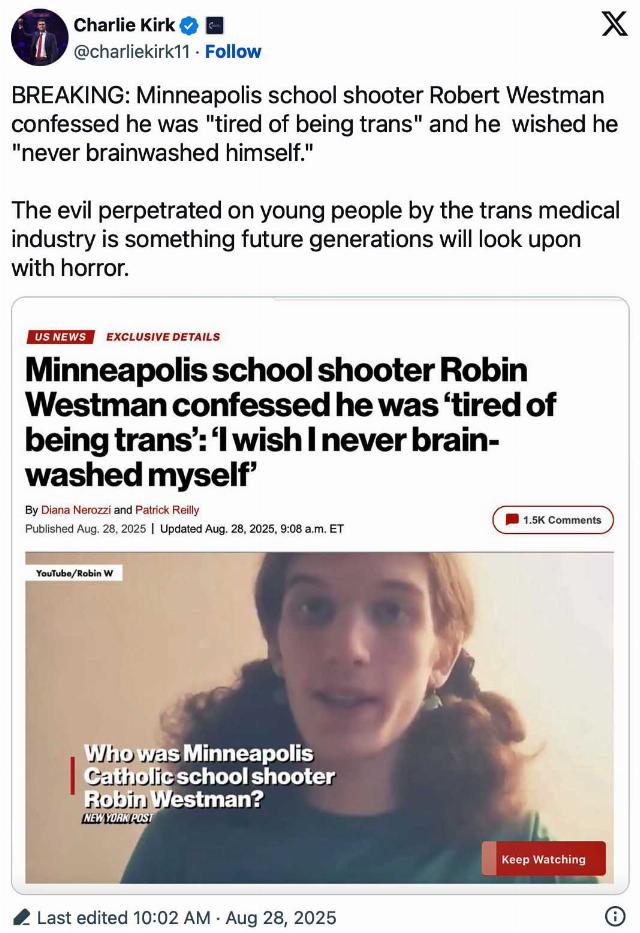Who owns our children?
Do children belong to their parents, or are they autonomous, independent legal entities who must be toilet trained and told when to go to bed, but can decide, at any age, to have gender transition surgery? Do parents have the power to regulate their children’s educations, the educations which they subsidize, or do professional educators own them?
Answer: they belong to their parents by DNA, law, morality and God’s Word.
Do schools have the power not only to “transition children,” but to hide that transition from a child’s parents?
Answer: hell no. Next question?
Actually, it’s a question the Supreme Court is now poised to answer. Jane Coleman at Legal Insurrection reports:
The October Term is about to begin at the U.S. Supreme Court, and another secret social transitioning case is waiting on its doorstep. Over a dozen civil-rights advocates have urged the Justices to grant review—and finally stop schools from “transing” children behind their parents’ backs.
The case is Foote v. Ludlow...
Schools, established and funded by local parents, act in loco parentis—in the place of the parents. They ensure parent’s interests in their children are upheld, unless, of course, they’re leftists. In that case, parents have no interests, no rights in their children who are owned by a benevolent, omniscient, omnipotent state.
The parents brought their original lawsuit against the Ludlow, Massachusetts, school committee in 2022 after they learned from one of its teachers that their child had secretly become “genderqueer.”
The teacher was fired for informing the parents. The parents lost the original lawsuit and the appeal that followed in 2024:
Earlier this year, a federal appeals court decided parents Stephen Foote and Marissa Silvestri had no right to be told when their 11-year old daughter “socially transitioned” to another sex in school. The school’s non-disclosure policy, the First Circuit court held, was necessary to promote a “safe and inclusive” environment for all of its students.
The girl in question was only 11. I presume the appeals court—remember: Massachusetts—did not explain how keeping queer identities from parents made anything “safe” or “inclusive.” Of course, in 2024 no such explanations were necessary. Merely invoking magic DEI incantations were sufficient. The parents, and others, disagree:
Sixteen “friends of the court” have now filed amicus briefs in support of the parents. Together, they argue that this time, the Court should act.
From Defending Ed:
If the right to direct their child’s upbringing means anything, it means that parents get to decide whether their child takes the medically consequential step of socially transitioning to a different gender. At the very least, it means that parents deserve to know when their child’s school has made that decision for them. This Court should say so, and it should say so now.
The Court’s intervention will protect parents and children not only in Ludlow, but in schools across the country where similar transgender protocols have become de rigueur.
Such policies deny parents the knowledge necessary to vindicate their parental rights. Without that knowledge, they have no standing to sue. Many of those filing amicus briefs agree:

Graphic: X Post
The Ludlow non-disclosure policy also violates the presumption that parents act in their children’s best interests, the Pennsylvania School Bd. Directors argue, by treating parents as “wrongdoers” without any evidence of abuse. “Established legal processes, such as mandatory reporting laws, exist to address genuine concerns of abuse, and schools must not bypass these safeguards to conceal information from parents,” they say in their brief.
“Since schools cannot make decisions rooted in parental power without parental consent, courts must evaluate whether a particular decision is rooted in parental or state power,” a coalition of states led by Montana argues. The First Circuit’s conclusion that the school’s decision to socially transition the parents’ daughter was well grounded in state power was “fundamentally wrong and at odds with centuries of history and tradition. ”
This is the kind of “reasoning” the First Circuit employed:
According to the First Circuit, using “gender-affirming” pronouns or a “gender-affirming” name isn’t a medical or mental-health treatment requiring parental consent: “Using the [s]tudent’s chosen name and pronouns,” the court wrote, is “something people routinely do with one another, and which requires no special training, skill, medication, or technology.”
If a girl wants to be called “Buffy” or a boy goes by “Biff,” that’s a bit different than changing one’s socio-psycho-sexual identity.
With any luck, the Court will grant cert and restore the primacy of parent’s rights. It’s long overdue.
Become a subscriber and get our weekly, Friday newsletter with unique content from our editors. These essays alone are worth the cost of the subscription.
Mike McDaniel is a USAF veteran, classically trained musician, Japanese and European fencer, life-long athlete, firearm instructor, retired police officer and high school and college English teacher. He is a published author and blogger. His home blog is Stately McDaniel Manor.